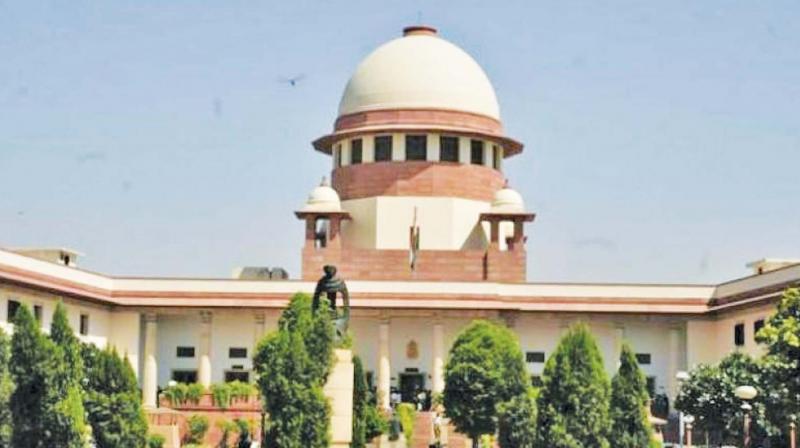SC to announce verdict on petition challenging Nageshwar Rao's appointment on Tuesday
During the hearing, CVC told the apex court that \"extraordinary situations sometimes need extraordinary remedies\".

New Delhi: The Supreme Court will pronounce on Tuesday the verdict on a petition challenging Nageshwar Rao's appointment as the interim CBI Director as Justice Arun Mishra bench is not sitting on Monday.
The petition was filed by NGO Common Cause, challenging Rao's appointment. It has also sought a SIT investigation into corruption allegations against CBI officers.
The development has come to light just weeks after a bench of Chief Justice Ranjan Gogoi, Justice Sanjay Kishan Kaul and Justice KM Joseph reserved the order after hearing the arguments of the then CBI Director Alok Verma, Union Government, Central Vigilance Commission (CVC), Common Cause, Congress leader Mallikarjun Kharge and others who were party in the case.
During the hearing, while confronting questions over Centre's sudden decision to send Verma on leave, CVC told the apex court that "extraordinary situations sometimes need extraordinary remedies".
Solicitor General Tushar Mehta, representing CVC in the case, made the argument while backing the Commission's decision. The Solicitor General's remark came after the Chief Justice questioned Mehta why the CVC did not consult the Selection Committee before taking a decision in haste.
"Government has to be fair. What was the difficulty in consulting the Selection Committee before divesting Alok Verma of his power? The essence of every government action should be to adopt the best course," CJI Ranjan Gogoi said while questioning Mehta.
The CJI also raised questions over the timing of the order and said: "Fight between the two senior most CBI officers did not emerge overnight. You had tolerated since July, it is not something that required immediate action as the circumstances were culminating for a long time...So why did the government take immediate steps to divest the CBI Director Alok Verma of his powers without consulting the Selection Committee?" asked the bench.
In response, Mehta replied that it was not a transfer as Verma is still the CBI director which is why the consent of the Selection Committee was not required. Mehta added that the CVC took cognisance of the emergent situation owing to which they made an interim arrangement. Further pressing on the exceptional nature of the situation, Mehta said: "Extraordinary situation arose, CVC order was passed impartially. Two senior most officers were fighting and investigating cases against each other, instead of probing serious cases. CVC's inaction would have been a dereliction of duty."
The CVC's superintendence over CBI encompasses surprise, extraordinary situations, Mehta said adding that "situations may arise which is not provided in law and authority has to address surprise situations. The CVC will become toothless if it doesn't act."
Attorney General K.K. Venugopal appearing for the DoPT told the bench that government was well within its jurisdiction to send both officers (Verma and CBI Special Director Rakesh Asthana) on leave by divesting them of their powers.
Senior advocate Mukul Rohatgi, appearing for Asthana, told the bench that the issue relating to suspension, departmental inquiry and dismissal lies within the sole domain of the central government.
During the hearing, senior advocate Fali Nariman, appearing for Verma apprised the bench that in all circumstances the CVC and Centre should have consulted the Selection Committee.
"Transfer includes divesting of functions and not just transfer from one place to another," he added. Verma had registered FIR against Asthana and this was the reason for the central government (DoPT) to divest him of his powers and functions, Nariman contended.
Senior advocate Dushyant Dave, appearing for NGO Common Cause, told the court that there was a dichotomy in arguments of Centre and CVC with regard to superintendence power over the CBI.
He said that the CVC has the power of superintendence only with regard to cases under the Prevention of Corruption Act and CVC cannot replace the Director of CBI. Dave also questioned the timing of the transfer. "Why was the CBI Director removed at 2 am in the midnight," Dave argued.
Senior advocate Kapil Sibal appearing for Congress leader Mallikarjun Kharge, who had filed plea against the Centre and CVC's decision of sending Verma on leave, argued that government does not have the power to remove or transfer the CBI Director.
"Transfer amounts to a public casting of doubt on the CBI Director. Approval of Selection Committee for transfer is a ring fence to protect CBI Director from executive influence, without this, the office will be in jeopardy," Sibal said.
Senior advocate Rajeev Dhavan, appearing for Deputy Superintendent of Police A.K. Bassi, who was transferred to Port Blair, argued that the very core of the issue is the autonomy of the CBI. "The DoPT order removed the CBI Director before a fixed tenure of two years. No matter what you call it, effectively it is a removal," Dhavan said.
During one of the hearings of the case, Attorney General Venugopal had defended the Centre's decision over sending Verma on leave and said that the dispute between Verma and Asthana was tarnishing the reputation of the institution. He had added that both the top officials of the investigating agency were "fighting like Kilkenny cats".
The top court was hearing a petition filed by Verma against the central government's order to send him on leave in view of the corruption allegations levelled against him. The central government had sent Verma and his deputy Asthana on leave after both levelled allegations of accepting bribes against each other. However, the CBI on October 25 informed that Verma and Asthana would continue to retain their posts as CBI Director and Special Director, respectively.

